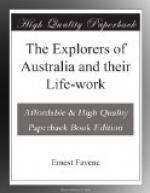Depot, Cooper’s Creek, April 21, 1861.
The depot party of V.E.E.* leaves this camp to-day to return to the Darling. I intend to go South-East from Camp 60 to get on our old track at Bulloo. Two of my companions and myself are quite well; the third — Patton — has been unable to walk for the last eighteen days as his leg has been severely hurt when thrown by one of the horses. No person has been up here from the Darling. We have six camels and twelve horses in good working condition.
William brahe.
[Footnote] Victorian Exploration Expedition.
Unfortunately, this was so worded that when Burke found it the same night, it gave him the impression that the depot party were all, with one exception, fairly well; and that, with fresh animals just off a long rest they would travel long stages on their homeward march. As a matter of fact, on the evening of the day that Burke returned, they were camped but fourteen miles away. But this was only the first of a series of singular and fatal oversights — that almost seemed pre-ordained by mocking Fate.
Burke consulted his companions as to the feasibility of their overtaking Brahe, and they both agreed that, in their tired and enfeebled condition, it was hopeless to attempt it. Burke proposed that instead of returning up the creek along the old route to Menindie, they should follow the creek down to Mount Hopeless in South Australia, following the route taken by A.C. Gregory.* Wills objected to this, and so did King, but ultimately both gave in, thereby signing their death warrant; for if they had remained quietly at the depot, they would have been rescued.
[Footnote.] See Chapter 18.
After resting for five days, and finding their strength much restored by the food, they started for Mount Hopeless, ill-omened name. Before they left, Burke placed in the cache a paper, stating that they had returned, and then carefully restored the ground to its former condition. The common and natural thought to mark a tree or to make some other unmistakable sign of their return, does not seem to have occurred to either of the leaders. It will be seen further on how this scarcely credible omission was a main factor in deciding their fate.
As they progressed slowly down the creek, one of the two camels became bogged, and had to be shot where it lay. The wanderers cut off what meat there was on the body, and stayed two or three days to dry it in the sun. The one camel had now to carry what they had, except the bundles that the men bore, each some twenty-five pounds in weight. They made but little progress; the creek split up into many channels that ran out into earthy plains; and at last, when their one beast of burden gave in, they had to acknowledge defeat, and commenced to return. After shooting the wretched camel and drying his flesh, the men tried to live like the blacks, on fish and nardoo, the seeds of a small plant of which the natives make flour. But the struggle for existence was very hard; they were not expert hunters, and the natives, who were at first friendly and shared their food with them, soon out-grew the novelty of their presence, began to find them an encumbrance, and constantly shifted camp to avoid the burden of their support.




